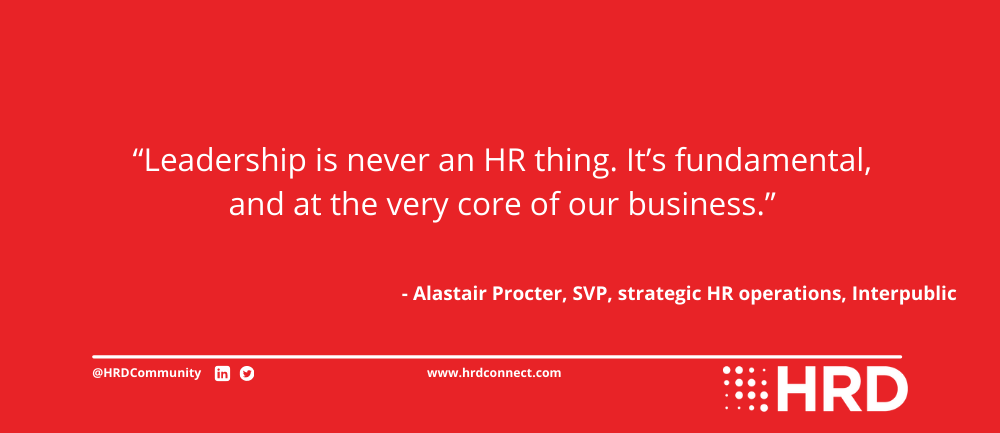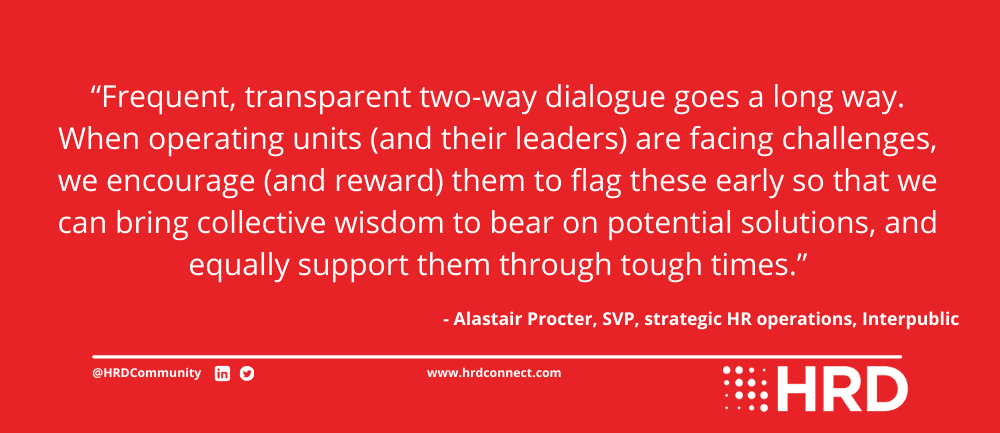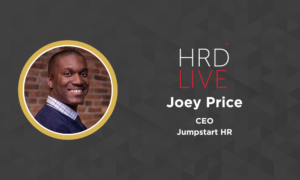-
Provided by

- Date published: May 17, 2022
- Categories
The ad industry hasn’t always been known for its caring, progressive leadership, but Interpublic’s SVP of strategic HR operations Alastair Procter is changing that.
The advertising industry has always been tough. It’s a world of intense competition and constant creative challenges, dominated by uber-confident creative rain-makers.
But the industry has never been more cut-throat than it is right now. The global context of rising inflation and a soaring cost of living is squeezing consumer spending, and the arrival of Web3 technologies is changing the digital landscape (or, in the case of the Metaverse, creating an entirely new one).
It’s an environment that demands strong leadership. Senior figures need to be able to reassure their staff while teasing out their creativity and driving them to produce the killer campaigns that cut through the competition. And, with the move to remote and hybrid working, they often don’t have day-to-day visibility over their people.
At Interpublic Group, one of the world’s biggest advertising conglomerates, Alastair Procter is witnessing these challenges on a daily basis. In the wake of Covid-19, he and his fellow heads are delegating more power, and trust, to their individual leaders than ever.
“Leadership is never an HR thing”, says Alastair, putting the emphasis firmly on the ‘never’. “It’s fundamental, and at the very core of our business.
“We’ve devolved a lot of responsibility to our managers, and said ‘your life probably got a bit more complicated, because you aren’t going to have all the people in all the time. You’re going to have to manage this kind of hybrid environment where some may be in and may not be.

“You’ve got to find a way through this, and work with your team to very much engage with them, to see what is going to work best and be most effective, being cognisant of all of these issues, including the propensity for bias with proximity and so forth.”
A huge challenge
Interpublic comprises around 53,000 employees across 17 countries, with siloes ranging from conventional marketing through to SaaS technology and varying in size from 250 to 13,000 employees.
Given the size of the operation, the company has to maintain a decentralised model out of necessity. This applies to leadership, too; agencies are empowered to define their own leadership strategies that work for their team and context. As Alastair says, “they generally know their business better than anybody else.”
However leaders across the organisation, wherever they are and whatever they do, are expected to conform to a basic set of standards.
“We are a strongly values-driven organisation and everyone would be expected to sign up and behave in ways which are consistent with these values,” Alastair says. “These values are not so much enshrined in corporate rhetoric and fancy website jargon, but rather lived out and validated in the ways that decisions get made day in, day out.
“As one example of this, when it comes to how we treat people, an unwritten principle is that we will do the ‘right thing’. We expect our leaders to engage with this and live it out in the way that they operate.”
‘Head, heart and guts’
To reinforce these core values, Alastair and his colleagues have created a senior-level leadership development programme that includes high-potential executives from across the company. This programme is designed to nurture these aspiring leaders into the finished article, and drive collaboration across the business.
The programme is based on three key qualities, which Alastair terms “head, heart and guts.” He believes that, “to achieve exceptional, sustainable performance, great leaders need elements of each of these three qualities.
“The ‘head’ is about rational logic, clear, strategic thinking, ‘heart’ is a desire to do the right thing for people, empathy and compassion, and ‘guts’ is a willingness (coupled with self-confidence) to stand up for what one believes in, take calculated risks and take a position.”
Alongside these tried-and-trusted leadership traits, however, Alastair wants Interpublic’s leaders to embrace their own vulnerability. As well as leading by example and making the right calls under pressure, he wants managers to accept the fact that they aren’t perfect, and remain humble in the face of the present challenges.

This acceptance of weakness might not come easily to certain ad execs, but it ensures Interpublic takes a measured approach to the demands it faces rather than rushing into ill-judged decisions.
“Our leaders have really stepped up and matured [over the last couple of years]. Not that they were immature, but they’ve had to learn to be a bit more vulnerable at times.
“I think that the way that many of our leaders have had to adapt and respond to challenging situations over the last 2-3 years, such as the brutalisation of people of colour such as George Floyd, or the pandemic itself, has been developmental in itself. Employee sentiment has in a way almost demanded that they stand up and confront the issues these things raise, and admit that in many ways, they don’t have all the answers.”
Constant communication
Measuring these traits is a challenge in itself, of course. As the MIT Sloan Management Review put it in a 2017 article, “companies often overrate their ability to measure the right things for the right reasons.” How do you gauge how humble or empathetic a person is? And, even more pertinently, how do you gauge the impact these characteristics are having in an organisation?
In Interpublic’s case, Alastair and his people have put a series of KPIs in place to monitor their leaders’ performance, linked to the company’s fundamental values of talent, DEI and collaboration. These KPIs have clear financial implications; 20% of the value of annual bonus pools (and individual bonuses) is predicated on delivery against KPIs.
However, Alastair believes communication is even more important than target-setting.
“Frequent, transparent two-way dialogue goes a long way. When operating units (and their leaders) are facing challenges, we encourage (and reward) them to flag these early so that we can bring collective wisdom to bear on potential solutions, and equally support them through tough times.”
This dialogue assumes even greater importance when leaders are not displaying the qualities required or straying from the desired set of characteristics.
“When you talk about values especially, there will be times when people choose to go their own way. I think that when it is evident that we have a fundamental mismatch in values, which impacts behaviour, we are more likely to want to talk about how we recognise this and part company as gracefully as we are able, versus ‘flogging a dead horse’.”

‘As good as it gets’
At present Interpublic is in the process of tweaking its hybrid model and encouraging staff to spend more time in the office. This is posing a considerable challenge in itself, as Alastair explains.
“As we all know, we’re not out of the pandemic yet and some people have quite understandable concerns about any kind of risk of contracting the disease, particularly if they are vulnerable. We’ve also got people who’ve put arrangements in place about their lives – they’ve got new patterns of workloads and they’ve got into a groove – and suddenly asking them to make time for a commute.
“So there’s been quite a big communication exercise for managers around things like being sensitive to individuals’ needs, and just making sure they engage with their people to understand people’s individual situations, so that no one is feeling pressure. We’ve put a lot of emphasis on that and we’re trusting our managers to kind of manage that accordingly.”
However, despite all this turbulence, Interpublic continues to flourish. Total revenue for the first quarter of 2022 was up over $300 million on the year, and the group has just taken a minority stake in The Famous Group, a technology company which is making waves with its augmented reality experiences.
Alastair is certainly pleased with the company’s evolution – and believes its light-touch, decentralised approach to leadership has been vindicated.
“Our retention at senior levels within the organisation is incredibly high – I attribute a lot of that to the values that we live and breathe every day, and the consistency with which we have done that for many years.

“Yes, you might be able to make a few extra bucks down the road working for an organisation making promises about all sorts of things, but most of our leaders are wise enough to know that the grass is rarely greener (having been burnt through previous experiences), and they choose to leave the shiny trinkets on the table, opting instead to stay in an organisation that is empowering, inclusive, affirming and respectful.
“I think, assuming that life’s financial pressures are broadly manageable, most of us get to a point when we realise that life is too short, and that working with good people in an organisation that we can trust to do the right thing, is about as good as it gets.”
When you read the quote back, it sounds almost like a chunk of marketing copy. But Alastair and his colleagues are walking the walk as well as talking the talk, proving that even in the relentlessly competitive ad industry, empathetic leadership pays off.








